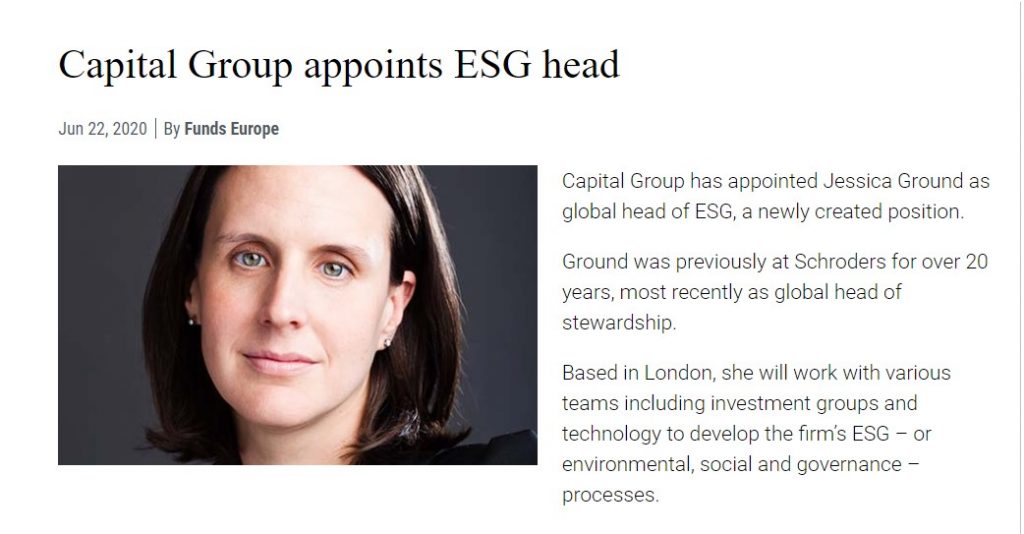Sustainable finance is no longer just a buzzword. ESG or Environment, Social and Governance criteria in investment is a strategy where investors put their money into companies that strive to make the world a better place. In this article, the Contentworks team is looking at the rise of ESG investing and what it means for brokers.
ESG Investing Momentum
Against a backdrop of covid-19, social unrest, climate change and other issues, this decade-old concept gathered significant mainstream attention in 2020. The total assets under management (AUM) for funds that adhere to ESG principles surpassed $1 trillion during the year. Likewise, green bond issuance rebounded in the second half of 2020, to a record level of $269.5 billion; representing 60% average annual growth since 2015.

The Role of Fintechs and Brokers in Driving ESG Initiatives
Fintech is one of the key drivers of financial inclusion and has a pivotal role to play in accelerating the path to achieving the United Nation’s Sustainable Development Goals (SDGs). Technology, by design, enables companies that are socially conscious to be more efficient and transparent, increase accessibility to financial products and, most importantly, identify and measure investments that achieve sustainability more than others.
We are also seeing renewed fervour among investors towards such products, after covid-19. Approximately 30% of investors now consider ESG issues as highly important for investment decisions. In such a situation, brokers, money managers, fund managers and financial advisors have a new role to play in offering relevant products as well as adhering to the evolving ESG regulatory environment prescribed by their respective financial regulators.
Will This Trend Continue in 2021 and Beyond?
With US President Biden ramping up focus on climate change, we see ESG investing growing well into 2021 and beyond. At the virtually-held Leaders Summit on Climate, President Biden said that we are in a decisive decade for tackling climate change and its disastrous consequences. The US has agreed to cut its carbon emissions by 50%-52% by 2030, from its 2005 levels. The President re-joined the Paris Climate Accord during his first day in office in January 2021.
The EU also aims to cut carbon emissions by at least 55% by 2030, from its 1990 levels, while the UK has made an ambitious target of reducing emissions by 78% by 2035.
Apart from climate change commitments made by global leaders, record issuance of sustainable debt and loans will drive the trend of ESG investing in 2021. According to the Swedish bank, SEB AB, the first institution to launch a green bond in 2010, $500 billion worth of green bonds will be issued in 2021. Meanwhile sustainability-linked loans are set to reach at least $1 trillion.
Demands of racial equity, through the “Black Lives Matter” campaign, have brought social issues to the forefront. This has been further exacerbated by covid-19. We expect investors to be more demanding about information like:
- How companies treat their employees
- How companies address social issues like LGBTQ+ and racial equality, both inside the company and in the broader community
- What are their inclusion practices and hiring principles?
What this means is that advisors will now be more proactive about asking clients whether they are interested in ESG investing, before another firm does. This will likely become a key differentiator.
Stance of Regulatory Bodies Worldwide
Europe has been a world leader in sustainable investing, being home to three-fourths of the global assets in the category. In 2018, the EU Commission had launched the “Sustainable Finance Action Plan,” as a regulatory reform framework, which was further strengthened in 2020 with the announcement of the EU’s “Green Deal“. On January 29, 2021, the European Securities and Markets Authority (ESMA) proposed a European legal framework for ESG ratings and assessment tools.
In September 2020, a subcommittee of the US CFTC released a report on managing climate change risks and added a series of recommendations to the country’s financial regulators and investors to analyse climate-related investments.
In China, the Shenzhen and Shanghai Stock Exchanges have listed new requirements for companies to disclose their ESG practices. There is a positive trend of ESG reporting in China, with 1,021 Chinese A-share companies publishing annual ESG reports by mid-2020, up from 371 in 2009.
The lack of standardised disclosure data from issuers can lead to a lack of growth in focus on ESG. In a recent survey, 45.5% of the respondents cite this reason as one of the top factors that could hinder ESG investments.
This is an important factor to consider for financial firms offering ESG assets. Providing quality information is critical to increasing trading volumes.
Examples of ESG in Fintech and Other Firms
There are many areas where ESG integrates with fintech and other financial companies, such as:
- Financial Inclusion
- Data and Rating
- Products and Services
- Impact Investing
Let’s look at how these firms are reaching out to people depicting their ESG initiatives. This includes organisations whose products might not be directly related to social or environmental upliftment. The aim here is to show your customers that you care.
One of the applications here has been the lending segment, providing affordable and accessible credit to marginalised groups. Tala is a US-based company offering the world’s most accessible consumer credit product, instant underwriting and lending to people with no formal credit history. We love their inspirational customer stories, depicting small business owners from Mexico to Kenya and their journey towards success powered by Tala.
Miotech is an AI-based platform that enables sustainable finance with ESG data. This Hong Kong-based company has a stellar team that analyses various financial products to provide investors with honest ratings, CSR reports, news sources and risk assessments. Check out their Twitter page for the latest developments in this space, along with some very well-crafted articles.
Talking about a brilliant team, how about actual climate experts in the company driving engagement with investors? AXA launched its climate school in 2021, to add value for HR departments to inform and train all employees towards sustainable professional transformation.
This is a great way for companies to show investors and customers that they are committed to social and environmental issues. Considering that young investors today are highly passionate about choosing everything, from workplaces to investments, based on ESG criteria, this is a unique way to build engagement.
Organisations today are investing huge resources in all things ESG. Capital Group appointed Jessica Ground as the new ESG head; also signalling a positive stance towards gender equality and women empowerment.

On a similar note, Plus500 made changes to its board of directors to improve upon its ESG frameworks and diversify the board’s composition and made announcements on multiple platforms.
S&P Global invested in a path-breaking study on the impact of gender diversity on stock prices.

Companies need to showcase their ESG efforts through social media, press, research papers, videos and thought leadership. Contentworks has wide experience in creating content for fintech and ESG products, including articles, press releases, education centres, eBooks and videos to help you take your ESG strategies forward. Get in contact with our team to learn more.
Enjoyed reading The Rise Of ESG Investing And What It Means For Brokers? Go ahead and hit share.
